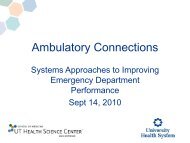COD E R E D
Download - Code Red: The Critical Condition of Health in Texas
Download - Code Red: The Critical Condition of Health in Texas
- No tags were found...
Create successful ePaper yourself
Turn your PDF publications into a flip-book with our unique Google optimized e-Paper software.
Section 3. School-Based Interventions and Their Links to Academic PerformanceWhat is the evidence that school-based interventions designed to promote physical activity andgood nutrition or to manage asthma have a positive impact on academic outcomes including grades, testscores, attendance and other factors related to academic outcomes such as attention/concentration,cognitive functioning and classroom behavior? Careful review of the literature on the impact of schoolprograms on academic outcomes has revealed one salient fact – there are few school health programsthat have measured factors related to academic performance and implemented rigorous outcomeevaluations. The majority of school health programs are designed to test the effect of the program on thehealth issue and prevention researchers have been slow to include academic factors of interest to theeducation community. The paucity of evidence is most likely due to the economic and scientificchallenges of implementing stringent research designs with adequate sample sizes in the school setting,and a lack of inclusion of academic measures, rather than a lack of connection between school healthprograms and academic outcomes. However, this paper will discuss the evidence that is available andnote school health programs that have been successful in impacting health and health-related factors butthat have not measured academic factors.School-Based Physical Activity InterventionsA rigorous evaluation of Project SPARK, an elementary school physical education program,demonstrated significant gains for reading, losses for language, and no differences for math scores on astandardized test, suggesting that, even with time taken away from the academic program for physicaleducation, overall academic functioning was not impaired (Sallis et al., 1999). Another physical educationprogram incorporating fitness or skill training for 75 minutes a day, compared to usual physical educationoffered three times a week for 30 minutes, demonstrated no significant decrease in test scores comparedwith controls (Dwyer et al., 1979). These studies suggest that implementation of physical education willnot impair academic achievement on standardized tests, and implementation of asthma managementprograms may enhance academic grades for low-income asthmatic children.The association between fitness and school performance has been examined by the CaliforniaDepartment of Education utilizing a state-required physical fitness test reported for all 5 th , 7 th and 9 th gradestudents since 2001 and the Stanford Achievement test. This cross-sectional analysis demonstrated asignificant linear association between standardized test scores (Stanford Achievement Test Ninth Edition[SAT-9]) of almost one million students (grade 5 n=353,000; grade 7 n=322,000; grade 9 n=279,000) andtheir fitness scores on the Fitnessgram, a teacher-administered physical fitness test measuringcardiovascular endurance, body composition, abdominal strength and endurance, trunk strength andflexibility, upper body strength and endurance, and general flexibility (California Department of Education& Standards and Assessment Division, 2002; Grissom, 2005). A dose-response effect was noted for allthree grades so that highest SAT-9 scores were reported by students who met three or more standardlevels among the six physical fitness measures, particularly among females, and particularly formathematics rather than for reading scores. While the Fitnessgram does not represent a school program,but rather a measurement of fitness, these data suggest a relationship between levels of physical activitysufficient to develop and maintain fitness and academic performance as measured by a standardizedachievement test. A recent meta-analysis of 44 studies pertaining to physical activity and cognition inchildren (Sibley & Etnier, 2003) concluded that exposure to physical activity was associated with animprovement in cognition of ½ a standard deviation – a relatively strong effect. While physical activity maybe very important for preventing obesity, diabetes and depression in children, it most likely will alsoimprove academic performance.Unfortunately, neither CATCH, nor Planet Health, nor Eat Well and Keep Moving, nor Bienestarmeasured factors related to academic outcomes in the evaluation of their programs. However, a study iscurrently in the planning stages to test the effect of CATCH plus classroom physical activities onperformance on standardized tests and factors related to academic performance such as attentionproblems, learning problems, study skills, attitudes to schools, attitudes to teacher, and academicE-21







